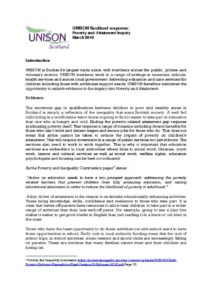 The enormous gap in qualifications between children in poor and wealthy areas in Scotland is simply a reflection of the inequality that scars Scottish society. A well fed child living in a comfortable warm home is going to find it easier to take part in education than one who is hungry and cold. Ending the poverty related attainment gap requires eradicating poverty itself. That requires a range of measures: decent benefits for those who can’t work and decent wages and secure jobs for those who do.
The enormous gap in qualifications between children in poor and wealthy areas in Scotland is simply a reflection of the inequality that scars Scottish society. A well fed child living in a comfortable warm home is going to find it easier to take part in education than one who is hungry and cold. Ending the poverty related attainment gap requires eradicating poverty itself. That requires a range of measures: decent benefits for those who can’t work and decent wages and secure jobs for those who do.
That does not mean that action cannot be taken to reduce the impact of poverty on children’s attainment. This will require investment in a range of public services not just schools. The services also need to work to work together. It is therefore vital that education services are embedded in local authorities. This enables links to social work, libraries, youth work, leisure and cultural services as well as social work, welfare rights, education psychologists and housing can be best coordinated.
As the Poverty and Inequality Commission paper states :
“Action on education needs to have a two-pronged approach: addressing the poverty related barriers that prevent children from fully accessing education, and raising educational attainment in order to reduce the likelihood of poverty in adulthood.”
A key driver of attainment is the chance to undertake educationally enhancing activities. These bring knowledge, skills, confidence and resilience to those who take part. It is clear that better-off parents have resources to allow their children to take part in a wider range of activities than their less well-off peers. For example, going to see a play live makes it easier to get good marks in English than just reading it in a book or out loud in the class.
Those who have the least opportunity to do these activities out with school need to have these opportunities in school. Sadly cuts in local authority funding mean that the cost of school trips, in school activities, music lessons and sports clubs are increasingly falling on parents. These are burdens that many families cannot meet and their children are losing out.
The attainment gap is a long-standing issue but the last ten years of austerity has made it worse. Cuts to a range of local government services mean that families are no longer able to access a range of support. In schools cuts to classroom assistants, school libraries, technicians and educational psychologist mean that children aren’t getting the what they need.
